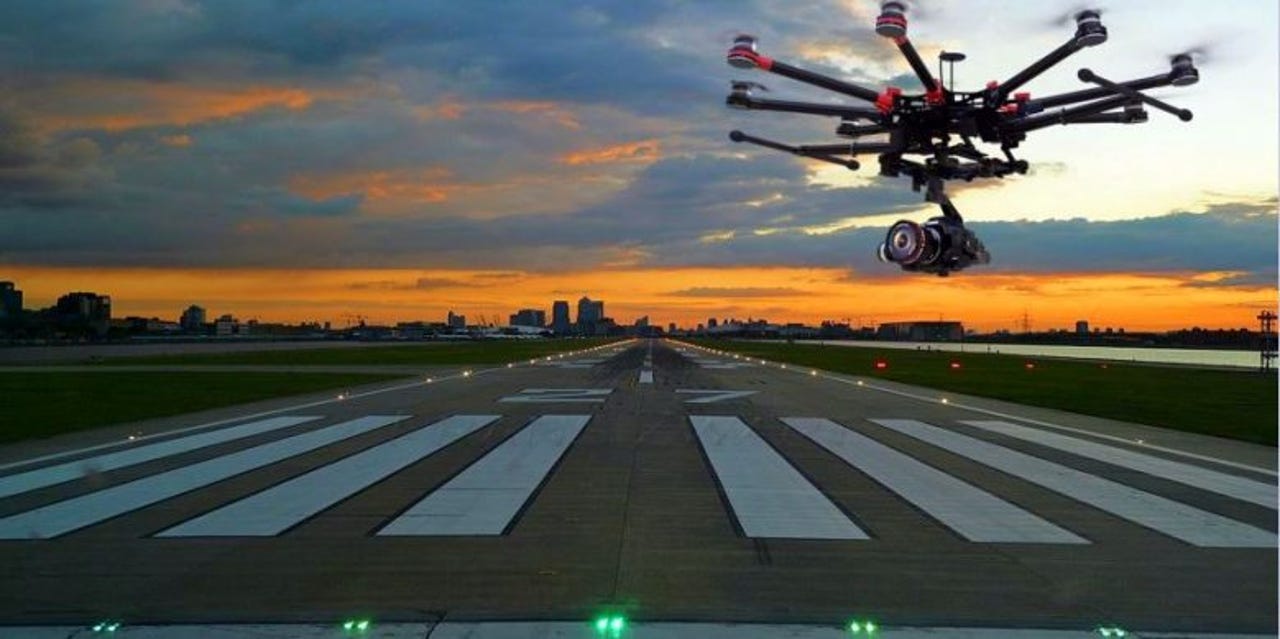Windows 10, Azure, drones: This system aims to ensure aircraft landings stay safe


The Canard drones' onboard sensors help automate the calibration of airport runway lights and radio beacons autonomously and securely.
Sometimes, the simplest ideas, the ones that crop up when having a drink with a friend, can become solid and brilliant projects.
Jorge Gómez knows something about that. Over a year ago, he set up Canard with a lifelong friend over a couple of beers.
"The calibration of navigational-aid systems is usually done by aircraft at most of the world's airports, except in Zurich where a helicopter is used," the Canard CEO and founder tells ZDNet. "And I thought that this could be more easily done with drones."
His idea was that using drones instead of manned craft to calibrate airport runway lights and radio beacons would not only save money but could allow for more frequent and accurate checks.
First, he researched the technical aspects of the idea and regulation issues relating to pilot licensing, and gaining authorization from airports and civil-aviation authorities. Then he brought two more friends into the project, Rafa Aguado, Juan Díaz, and Ana Pérez.
The first pat on the back for the idea came from the European Commission via the Finodex project, which provides support to entrepreneurs developing projects based on EU internet middleware Fiware and the reuse of open data.
Next, the European Space Agency selected Canard to enter its Madrid business incubator. It has two: one in Madrid and one in Barcelona. From there, Gómez's firm collected several prizes and enough funding to develop the project rapidly.
The Madrid-based startup has adapted third-party unmanned aerial vehicles, adding sensors and its own software so that they can make a fast and safe calibration of an airport's navigation aids. It has designed a new system for the drones to collect and process the information.
The drones' onboard sensors collect the data that enables the system to carry out the calibration autonomously and securely, helping ensure aircraft land safely.
Until recently, the startup was tapping into various technologies for the entire process, including a variety of PCs, Apple Macs, tablets, and Amazon Web Services. The team has just switched to Microsoft's Azure cloud platform, which has helped the firm create "a homogeneous environment that works", Gómez says.
Along with Microsoft's SharePoint document-management system, Canard uses Microsoft Surface Pro 2-in-1s to capture the data coming in from the drones.
The end result is a reduction by a quarter in the time required to perform a calibration, at a cost that's about a quarter of that of the old manned aircraft methods, according to Gómez. Furthermore, human error has been removed from the equation because all the calibration is now performed automatically.
Canard, or the Calibration of Navigational Aids using AR Drones, has already got 30 worldwide airports interested in its system.
Among them are San Francisco, Dallas, and Seattle in the US, and Paris and Amsterdam in Europe. The name of course also means 'duck' in French. "Ducks are very good at ground reconnaissance," Gómez says with a wink.
This month, the Spanish startup is due to close a €1.2m ($1.28m) funding round. The investment will allow it to improve the calibration and inspection of its PAPI, or Precision Approach Path Indicator, systems, which help a pilot acquire and maintain the correct approach in the vertical plane to an airport and use radio aids to land.
Read more about the technology scene in Spain and Portugal
- Back to self-driving school: The simulator teaching vehicle AIs road sense
- Can open source and open systems really open the door to healthier democracies?
- Meet Alice, the Microsoft Cortana-based AI chatbot who aims to make you look stylish
- This nanotechnology microsensor is so sensitive it can detect beat of insect wings